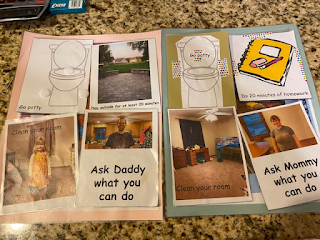Screen Time Project

Hi Parents! I wanted to put myself out there a little to tell you about a parenting project I'm trying at home. My 6- and 3.5-year olds love their screen time. The 6-year-old loves his video games, and the 3-year-old is always asking for iPad. My husband and I try to limit their screen time, but we're mentally managing so much as two working parents. Managing screen time just becomes one more thing. And honestly, we probably give in at times and give them screens because we need some quiet time just to get things done around the house. Or sneak in a quick nap. Whenever we do this, I feel guilty. Too much screen time is not good for their developing brains, and there are other things they could do if I had the brain space to think of them. So, I thought of a plan, a system inspired by my observations of special educations classes. It's a task completion board. Here are some pictures: The above picture shows a task board with 4 tasks for each kid. These particular ones are g...

